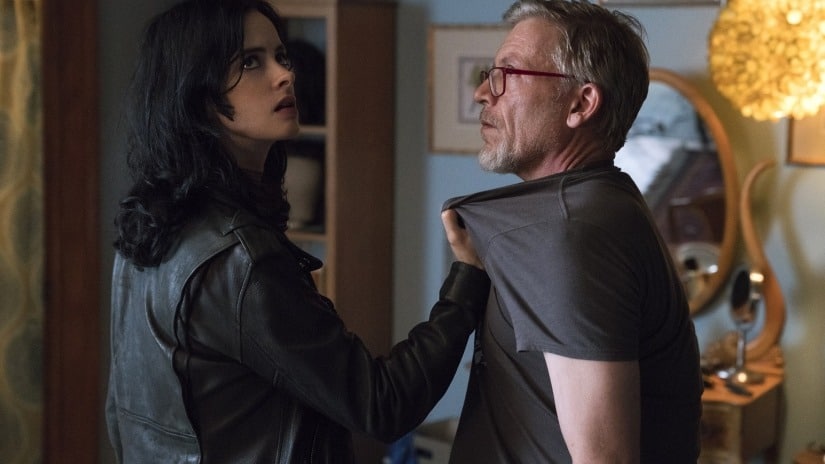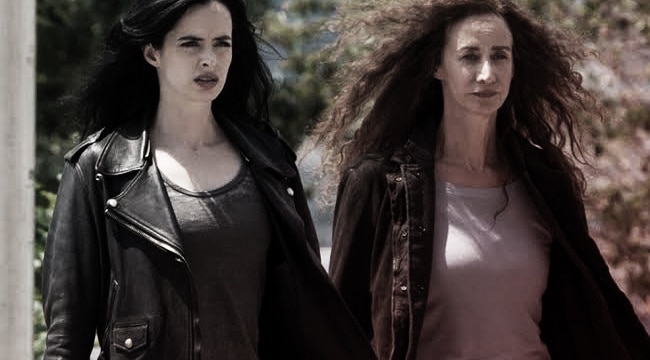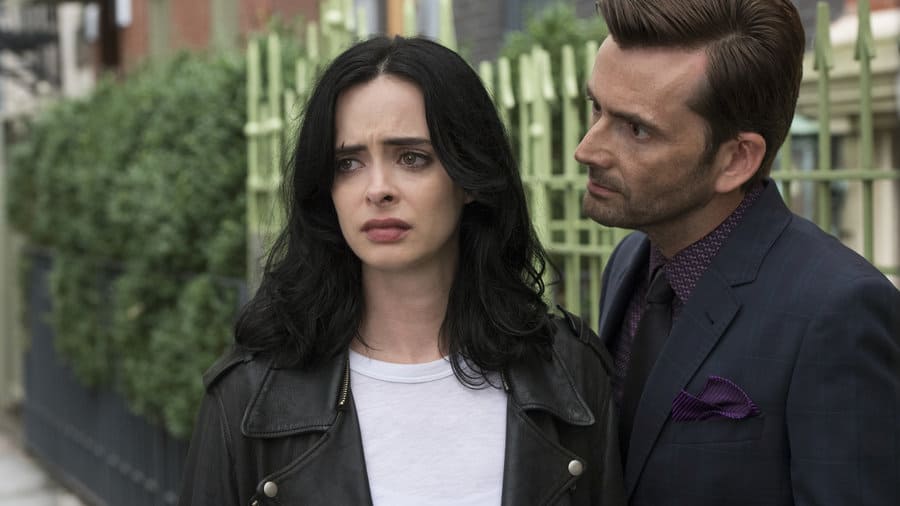The hunt for IGH and the secrets of Jessica’s past are upon us! But will our favorite Super P.I. be able to cope with the ramifications those answer bring?
Jessica Jones: Season 2
(Netflix)
Airdate: March 8th, 2018
Director: Anna Foerster, Minkie Spiro, Mairzee Almas, Deborah Chow, Millicent Shelton, Jet Wilkinson, Jennifer Getzinger, Zetna Fuentes, Rosemary Rodriguez, Neasa Hardiman, Liz Friedlander, and Uta Briesewitz
Writer: Melissa Rosenberg and Brian Michael Bendis
Based on the Marvel Comics Created by Brian Michael Bendis and Michael Gaydos
What You Should Know:
Jessica Jones is a dark, sullen, drunk private investigator with super-strength. Last season culminated in a final confrontation with the utterly vile, mind-controlling villain Kilgrave, in which Jessica snaps Kilgrave’s neck, killing him. Afterward, her sister, Trish “Patsy” Walker, informs her that she might have a lead on IGH, the mysterious company that gave Jessica her powers. When Jessica finally returns to her apartment, she finds Luke Cage (her primary love interest for the season) has disappeared, and her neighbor, Malcolm, has come over to see if she’s okay. Where do we go from here?
What You’ll Find Out:
Season Two of Jessica Jones reveals that IGH, the company responsible for giving her powers, is the brainchild of a Dr. Karl Malus and that Jessica is not the only recipient of powers via illegal human experimentation by Malus. In fact, among the others created by Malus is Jessica’s own mother, Alisa. Alisa is stronger than Jessica but also lacks what little self-control Jessica has, resulting in Alisa killing a large number of people.

The return of Alisa into Jessica’s life seems to throw Jessica into a tailspin, resulting in Jessica accidentally killing a security guard, having a mental breakdown in which she sees and speaks to Kilgrave, and alienating nearly everybody in her life. After much internal debate as to whether Alisa can be trusted to not continue to kill, Jessica eventually turns her over to the police. Jessica brings in high-powered attorney Jeri Hogarth (who is struggling with the early stages of ALS and is desperately seeking a cure throughout the season), Jessica attempts to prevent Alisa from being transferred to the Raft, a prison for powered individuals, but the deal requires a confession by Alisa of all of IGH’s dealings, which Alisa will not give unless Malus, now her lover, is safely out of the reach of the law. Jessica sets forth in acquiring forged passports and documents (made by her current love interest and superintendent, Oscar). Trish, responsible for starting the hunt for IGH in the first place, eventually interrupts Jessica’s plan to get Malus out of the country by kidnapping Malus and convincing him to perform the power-granting, gene editing procedure on her. The process is halted by Jessica, who scares Malus so badly over nearly killing Trish that he kills himself by blowing up his own lab. Malus’ death drives Alisa into another killing rage and she escapes from prison. Blaming Trish for Malus’ death, Alisa hunts down to Trish to kill her. Jessica and Alisa converge on Trish’s hospital room and Jessica manages to talk to Alisa down, but when the police show up, Alisa kills one of them on her way to escaping and going on the run. On the run, Alisa is eventually joined by Jessica who has decided to abandon her life and help her mother escape. It doesn’t take long, however, for Alisa to realize that escape is improbable and that the fugitive life is placing Jessica’s life in danger. The pair stops at an amusement park, and Alisa turns on the Ferris wheel, creating a beacon for the police to find her. While on the Ferris wheel, Alisa is shot with Jessica sitting next to her, but not by the police. There stands Trish, gun in hand.

As the season comes to a close, we see that Jessica has shut Trish out, driven her associate Malcolm away, lost her mother a second time, and lost the trust of Hogarth. But hope is not all lost, as we close on Jessica having a quiet dinner with Oscar and his son, leaving at least a small chance that our dark and sullen heroine can put the past behind her and move forward into a brighter future.
What Just Happened?
This was a busy season for Jessica and company, but it essentially boils down to just a few narrative threads and a couple of major thematic entanglements if you really think about, yet there still seems to be so much more happening.
Anybody I’ve talked to about this season has already heard these words, but I just can’t seem to escape them. “Good effort. Lacks focus.” In many ways, there was just too much going on, and quite a fair bit of it was good but unnecessary. For example, the Hogarth development was very interesting, but what did it do to push the story forward for the titular character? Seeing a strong, powerful woman on screen is always a welcome sight, and they don’t come much bigger than life than Hogarth. The addressing of ALS and the mentality that must often come with such a heartbreaking disease was very well done, but I still don’t feel it furthered the narrative for anybody but Hogarth.
It would seem the lack of focus also led to a disconnection from the greater Netflix Marvel universe. Each show after the premiere season of Daredevil has built deeper layers connecting the universes of these street-level heroes and vigilantes, but there appeared a glaring omission in this season. In many cases, the Rosario Dawson played Night Nurse has been used as the connective tissue, and she served that role in Season One but was absent. The only real ties to anything outside of Jessica’s own personal universe were a brief appearance by Foggy Bear and a few off-hand mentions of Rand Corp.
Malcolm, Jessica’s recovering addict neighbor turned underappreciated assistant turned associate turned Trish’s lover turned budding PI, was a bright point in the season as far as character writing and development. Eka Darville’s performance was superb from start to finish. That said, it is hard to overlook the notion that the entire point of his character in this season seems to have been to have somebody close to Jessica for her to eventually push away, and in the end, that does neither character justice.

Trish’s development this season was complex. We see in Trish a continuation of the theme of addiction (which I will touch on in a moment), but we also see a character-driven beyond the point of logic. Trish’s envy of Jessica’s powers leads a character who should be the heart of the show to make reckless and ugly decisions. By the end, we get a glimpse of Trish potentially having enhanced reflexes, so maybe we’re ready to see her version of Hellcat now, but at what cost? I’d like to note that, in the comics, Patsy “Hellcat” Walker did not start out with any powers other than being very pretty and athletic. It was her drive to help people that eventually (nearly 30 years after her debut) caused her to suit up in the first place. The cinematic version, however, is driven by the same desire to help (presumably, although that drive could possibly be attributed to her addiction to fame), but the belief that she needs powers to do so stifled the character in a way that she became hard to root for, honestly.

Beneath the surface of this season’s 13 hours of origin stories (for both Jessica and Trish), lies the what feels to me to be the deeper theme of the Jessica Jones franchise: addiction. Nearly every character on this show is deeply flawed by an addiction to something, be it fame, power, drugs, alcohol, sex, truth, ego, pain, or love. The execution of addiction in Jessica Jones speaks directly to the social consciousness, as most of these addictions are confronted but never resolved. We acknowledge these varied issues, but for the possessor of the addiction it becomes naturalized and pushed to the side. Perhaps this speaks to our current era, in which anything anybody could want is available at the click of a button? I’ve said before that nearly everything I know about being a human being I’ve learned from comics, and if that holds true, what does this prevalence of addiction teach us about ourselves? Just some food for thought.
A few final thoughts:
- Whatever complaints I may have about Season Two, and how far it seemed to fall from Season One, it was remarkably well acted across the board.
- Every episode of this season was directed by a different female director, which is pretty damn cool.
- Robert “The Whizzer” Coleman, another product of IGH with the power to be moderately fast “when he’s frightened” is a shout-out to an early Timely (proto-Marvel) character from the 1940s. The comics Whizzer, Robert Frank, got his powers from an injection of mongoose blood (Coleman has a pet mongoose named Emil), and Frank’s father was named Emil. Fun Easter egg and I’m really sad we didn’t get more of Coleman before Alisa added him to her body count.
- The character of Pryce Cheng, a rival PI that first tries to recruit Jessica and then tries to destroy her, made no sense to me whatsoever. The writers do a great job at establishing his narcissism and egocentricity, yet after he and Jessica have a discussion about how fatal for a PI it would be to have skeletons in their closets, he goes on to arrange a burglary of Jessica’s apartment and he attempts to shoot Alisa himself, shooting Jessica in the process.
- Oscar was extremely likable, and his story was nice. The painting he drew of Jessica was a piece by David W. Mack, the cover artist for the Alias comics series.
- The odd return of David Tennant’s Kilgrave as a mental delusion of Jessica’s felt very gratuitous. It was almost as if the writers knew this season was going to be less successful, but at least if they gave Tennant a few episodes, they’d be able to draw in his fanbase.

- If you’re like me, there was something off about the scene in the club, but I just couldn’t place what it was. It nagged at me until, thankfully, a friend of mine with some expertise, happened to point it out nice and clear. Musician, sound wizard, and great all-around guy, Leslie Porter Miller writes, “Ever wonder how concert/nightclub scenes are filmed, with all the extras dancing in the background and the dialog still intelligible? There’s some playback music then an AD or someone claps the beat and the music is muted, so dancers are just performing to that. Then in Post Production music is laid in, the dialogue may or may not be replaced (a process called ADR) and everything gets combined creating the final scene. Whoever was in charge of the sound mix never bothered to add music to most of the nightclub scenes so under the dialogue, almost nothing, not even Foley crowd noise. And the actors were all ‘yelling’ as if in a loud nightclub.” So, if you were bothered and didn’t know why (which I’m sure is a small minority, but still), that’s why. Thanks, Porter!
Rating: 6/10
Final Thought: It may have sounded like I was hard on the show, but I don’t mean to say that it was a bad show and not worth watching. Yes, it felt several episodes too long, but still, it was enjoyable. Also, I’m testing a new format where I’m trying to streamline my recaps, so if you liked or hated the way I did the recap, please leave me some feedback for future reviews!
Follow us on Twitter and Like us on Facebook!
Join our Age of Social Media Network consisting of X-Men, Marvel, DC, Superhero and Action Movies, Anime, Indie Comics, and numerous fan pages. Interested in becoming a member? Join us by clicking here and pick your favorite group!






